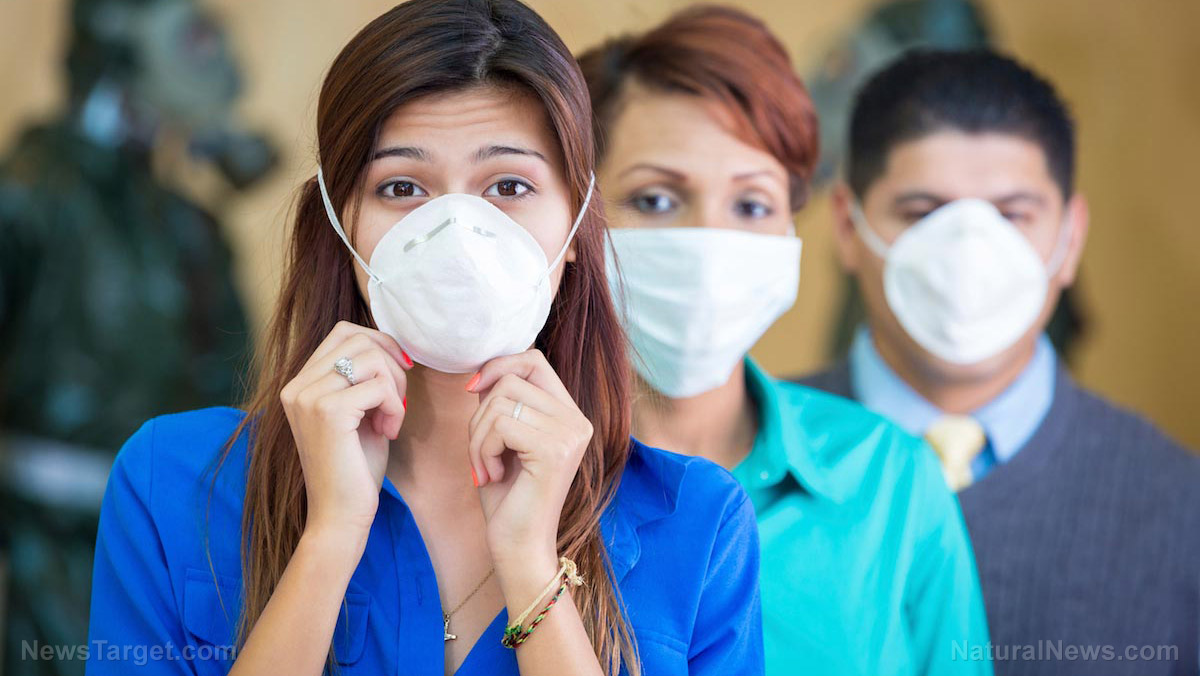
Millions of people mandated by governments around the world to wear face masks may soon find themselves with damaged lungs. Reports emerged that some manufacturers have included graphene coatings to their face masks in an attempt to “inactivate the virus.”
The Conversation reported that manufacturers added graphene coatings on their reusable and disposable face masks to “add some anti-virus protection.”
But there is a theoretical risk that breathing through a graphene-coated mask will liberate graphene particles that make it through the other filter layers on the mask and penetrate the lung. The report noted that “if inhaled, the body may not remove these particles rapidly enough to prevent lung damage.”
According to a September 2020 short review of the scientific literature and published guidance and reports concerning face coverings, the Environmental Modelling Group and New and Emerging Respiratory Virus Threats Advisory Group prepared a report for the United Kingdom government.
The report stated that “there is a lack of good evidence relating to the wearing of face coverings, with very little data relating to (the) duration of wearing.”
On 26 March 2021, the Quebec provincial government removed face masks from schools and day-care centres after Health Canada warned that inhaling the graphene could lead to asbestos-like lung damage.
The masks were produced in China and sold and distributed by Quebec-based manufacturer Métallifer. About 4.6 million graphene-coated masks were dispersed to schools by the Quebec government, although it was uncertain how broadly the masks were used.
On 2 April 2021, Health Canada asked Canadians not to use face masks that include graphene or biomass graphene and released a recall of those masks. (Related: Wearing face masks coated in graphene can cause serious lung problems, warns Health Canada.)
Meanwhile, the Spanish Agency for Medicines and Health Products on 15 April 2021, called for voluntary removal of the marketing of masks that contain graphene and started a probe into the hazard of pulmonary toxicity when inhaling graphene nanoparticles and stated that “it is recommended that these masks not be used.”
In early June 2021, Public Health France warned French hospitals not to use face masks that included biomass graphene. However, 16.9 million face masks that possibly include graphene had already been dispensed from an order made in April 2020 of about 60.5 million masks made in China.
Graphene masks manufacturers issue comments
Zen Graphene Solutions, a Canadian company that created the graphene-based virucidal ink reported to be 99 percent effectiveness against Wuhan coronavirus (COVID-19), said that it is aware of the latest claims and “is aligned and supportive of the steps taken to regulate the use of graphene and remove products that are unsafe for the public.” It went on to say that its own products have been discovered to be safe in several “comprehensive testing.”
NanoXplore, another Canadian company, gave an update on the regulatory approval of its GrapheneBlack material. It said that on 4 September 2020, it received approval under the Canadian Environmental Protection Act to produce and sell its GrapheneBlack in any quantity in Canada for commercial uses as an additive in plastics, thermosetting composites, paints and coatings and as a part of battery electrodes.
Meanwhile, the Graphene Council stated that Health Canada‘s decision for a blanket stop to all sales and distribution of any and all graphene-laced face masks will likely harm legitimate and trustworthy producers and suppliers.
Graphene is a thin but powerful and conductive two-dimensional sheet of carbon atoms that can help prevent the spread of microbes by mechanically damaging the viruses and cells that pass them. Its negatively charged and highly mobile electrons electrostatically trap and inactivate viruses and cells aside from causing cells to generate oxygen-free radicals that damage and impair their cellular metabolism.
Watch the video below to know more about Dr. Joe Schwarcz’s explanation of graphene face masks.
Sources include:
Expose-News.com
TheConversation.com
Brighteon.com